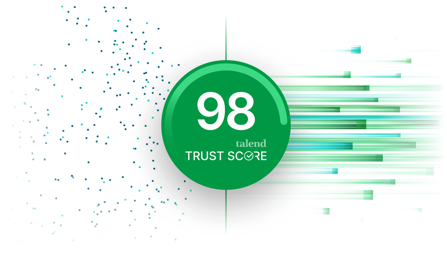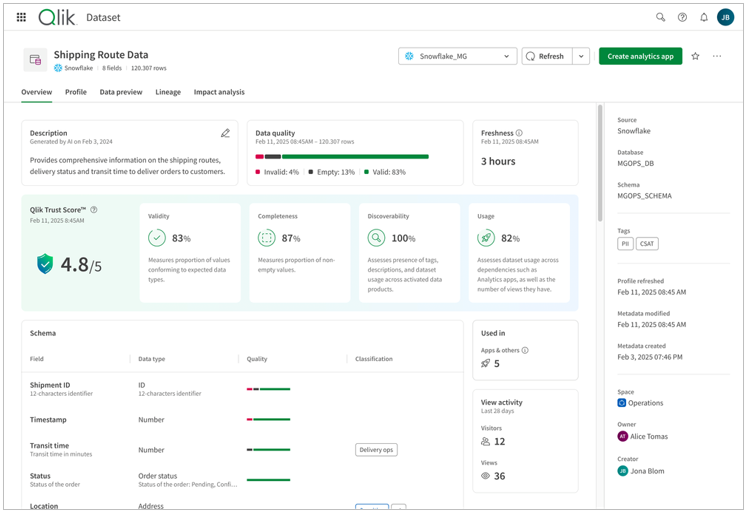
Introducing Qlik Trust Score
To evaluate trust in data, organizations need a metric-driven, objective measure that can be tuned to meet their specific definitions of data quality. A flexible and transparent approach ensures organizations can adapt trust assessments to their unique operational data quality needs.
In this article you will learn how Qlik Trust Score în Qlik Talend Cloud can help.
In today’s data-driven world, trust in data isn’t just important—it’s essential. Organizations depend on high-quality data to drive informed decisions, fuel innovation, and maintain a competitive edge. But data quality isn’t one-size-fits-all. In customer service, a missing address might be acceptable if the primary contact method is valid. However, an incomplete or incorrect address can lead to payment failures and operational inefficiencies in billing and invoicing.
To evaluate trust in data, organizations need a metric-driven, objective measure that can be tuned to meet their specific definitions of data quality. A flexible and transparent approach ensures organizations can adapt trust assessments to their unique operational data quality needs.
Qlik Trust Score in Qlik Talend Cloud evaluates a dataset’s trustworthiness by aggregating various data quality dimensions. It provides a holistic view to help organizations identify gaps and prioritize improvements, with a numeric score (ranging from 0 to 5) for a quick assessment of dataset reliability.
Here are the key dimensions used to evaluate dataset trustworthiness, along with examples:
- Validity – Measures the proportion of values that conform to expected data types and formats. The expected data types and formats are obtained using built-in semantic types. For example, a valid email address must contain “@” and a domain.
- Completeness – Assesses the proportion of non-empty values within a dataset. For instance, missing primary contact information in a customer database could impact outreach efforts.
- Discoverability – Evaluates how well a dataset is documented and incorporated into operational workflows. This includes checking whether the dataset has meaningful tags and descriptions and whether it is included in an activated data product. For example, a sales dataset with appropriate tags, descriptions and included in an activated data product would score higher than an undocumented, siloed dataset. This is because an activated data product in the data marketplace that includes the dataset would enhance visibility and accessibility for data consumers, increasing overall value.
So, how can you improve dataset discoverability? One quick way is by adding clear descriptions. With generative AI-based dataset description capabilities in Qlik Talend Cloud, you can effortlessly generate precise dataset descriptions, making them easier to find and understand.
- Usage – Measures dataset utilization across dependencies such as analytics apps, and the number of times assets using the dataset has been viewed. This dimension reflects the dataset’s true importance and its relevance to specific use-cases. For example, a financial dataset embedded in an executive dashboard and accessed frequently by decision-makers would score higher than an isolated dataset with little visibility.
Overview of Qlik Trust Score for the Shipping Route Dataset from Snowflake
By evaluating datasets across multiple dimensions, Qlik Trust Score provides organizations with a clear, actionable view of data quality and reliability. To optimize performance and flexibility, it supports two processing methods. Pushdown processing, available exclusively for Snowflake datasets, triggers quality computations directly within Snowflake. This approach ensures efficient, in-data warehouse processing without data movement. Meanwhile, pull-up processing, available for all datasets, enables quality computations within Qlik Talend Cloud, enabling broader data quality assessments without relying on external processing resources.
Key Benefits of Qlik Trust Score
- Customizable Weighting – Organizations can tailor the Qlik Trust Score to align with their specific data priorities. By adjusting the percentage weights of each dimension, teams can emphasize what matters most—such as validity for regulatory compliance or discoverability for analytics adoption. Non-mandatory metrics (such as usage or discoverability) can be disabled, ensuring the score accurately reflects business needs.
Tunable dimension weights to align with organizational specific data quality priorities
- Actionable Insights – Qlik Trust Score goes beyond a single number by offering detailed insights into data quality. Using the “Data Preview” tab, users can drill down at a column level, such as invalid values or missing metadata, to pinpoint issues quickly.
- Transparency & Collaboration – Trust in data improves when teams can see where the data is coming from and how fresh the data source is. Dataset lineage provides this information, fostering an open culture of transparency and collaboration across data and analytics teams. Dataset freshness lets you see when the data source was last updated.
Conclusion
Qlik Trust Score is more than just a metric—it’s a powerful tool for building confidence and enhancing data trust. With customizable scoring, organizations can tailor data quality dimensions to align with their data priorities, focusing on the factors that matter most.
Available in Qlik Talend Cloud Enterprise Edition, Qlik Trust Score delivers robust, reliable data quality insights. For more details, visit the Qlik Trust Score documentation.
For information about Qlik™, click here: qlik.com.
For specific and specialized solutions from QQinfo, click here: QQsolutions.
In order to be in touch with the latest news in the field, unique solutions explained, but also with our personal perspectives regarding the world of management, data and analytics, click here: QQblog !

